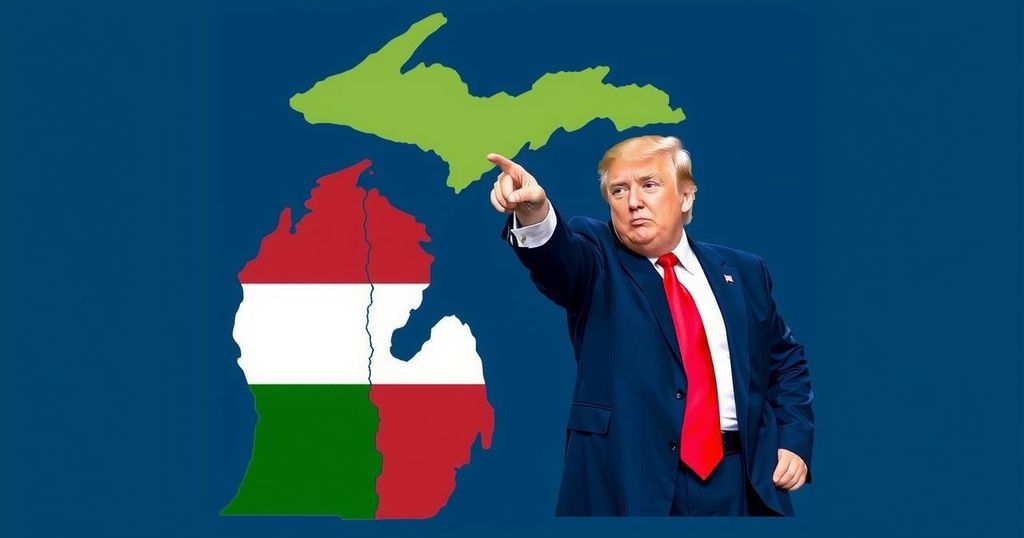The Shifting Allegiance: Arab Voters in Michigan Consider Trump in Light of Recent Conflicts
The article examines the recent shift of Arab American voters in Michigan towards supporting Donald Trump for the upcoming elections. This change is motivated by dissatisfaction with the Democratic Party’s handling of the Israeli-Palestinian conflict, particularly amidst the ongoing violence in Gaza and Lebanon. Key community figures express their intent to leverage their electoral power to demand accountability from political leaders, marking a potentially decisive influence in Michigan’s electoral landscape.
In the context of the upcoming United States elections, there is a notable shift among Arab American voters, particularly in Michigan, towards supporting former President Donald Trump. This unprecedented trend, largely attributed to dissatisfaction with the Democratic Party’s approach to the Israeli-Palestinian conflict, has been amplified by current geopolitical tensions such as Israel’s military actions in Gaza and Lebanon. Activists within the Arab community, such as Yemeni American Samraa Luqman, express frustration over what they perceive as a decades-long neglect of their interests by the Democrats, particularly under the leadership of Vice President Kamala Harris and President Joe Biden. Luqman argues that the Democratic Party has lost the trust of Arab voters by siding with Israel during its military campaigns. She openly declared, “I will show up the next day if Harris loses, I will say: It’s because of this community, it is because of Gaza and because of the genocide, that you lost… I do not believe that a genocide can ever go unpunished. And for me, it should never, ever be rewarded with a second term” – Source. Conversely, Trump’s campaign has sought to engage with the Arab American community, attempting to counteract his historical anti-Muslim rhetoric by expressing a desire to achieve peace in the Middle East. His decision to visit Dearborn, known for its significant Arab population, serves as a strategic effort to bolster support from this demographic, which may play a vital role in the swing state of Michigan. Activists and local leaders have begun to vocalize their support for Trump, with figures like Albert Abbas advocating for accountability from the current administration regarding the ongoing violence in the Middle East. They argue that Trump’s administration was characterized by fewer military conflicts, despite the controversy surrounding his foreign policies. Mayor Bill Bazzi of Dearborn Heights further emphasizes Trump’s commitment to peace, asserting that during Trump’s presidency, there was a notable absence of new military engagements. He stated, “Trump wants peace. He doesn’t want wars.” However, this sentiment is met with skepticism by others in the community who highlight Trump’s previous actions, such as the travel ban targeting several Muslim-majority countries and his support for Israeli policies that many in the Arab community perceive as repressive. In contrast, the Democratic side has been embroiled in debates over policy consistency and their commitment to Arab American interests. Especially notable is Luqman’s remark on the need for the Arab community to leverage its electoral power to effect change, retribution that has been dismissed historically by Democrats. “If we exert our political muscle, and we show that we have an impact that will cause reverberations in the elections, it will show that we have the strength and the voter bloc to make a change,” posits Luqman.
The article discusses a significant emerging trend among Arab American voters, particularly in Michigan, as they begin to gravitate toward supporting Donald Trump in the lead-up to the 2024 elections. This shift marks a departure from the long-standing allegiance to the Democratic Party, driven largely by discontent with the party’s unwavering support for Israel amidst the conflict in Gaza and Lebanon. This political realignment is underscored by grassroots advocacy and community organizations aiming to hold political leaders accountable for their foreign policy decisions. Trump’s outreach efforts, as well as local political dynamics in cities like Dearborn and Hamtramck, illustrate how complex community sentiments regarding foreign policy and domestic issues are shaping electoral choices.
In summary, the article illuminates a pivotal realignment in the political preferences of Arab Americans, particularly in Michigan, as they reconsider their traditional loyalty to the Democratic Party in light of current geopolitical events and dissatisfaction with existing leadership. The engagement between Trump and the Arab community illustrates a new political landscape, where community leaders advocate for change through strategic voting, challenging the status quo to ensure their interests are addressed. The forthcoming elections may very well hinge on this evolving voter sentiment, potentially altering the dynamics within one of the key swing states.
Original Source: www.aljazeera.com




Post Comment